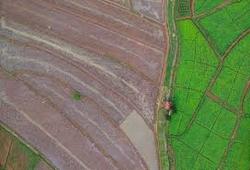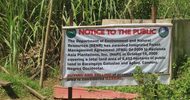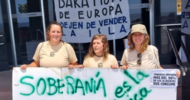Press release: Stop food estate plans in Papua
Translated from Bahasa Indonesia
Ten civil society organizations (CSOs) members of Civil Society Coalition Against Food Estate in Papua strongly reject President Jokowi’s plan to develop a food estate with an area of 2,052,551 ha. This area consist of 1,304,574 ha protected forest, production forest, permanent production forest and conversion forest, and 734,377 ha of areas for other purposes (APL).
The Civil Society Coalition consist of Papua-based CSOs, including: Wahana Lingkungan Hidup Indonesia (WALHI), Papua KPCK Synode of GKI in Tanah Papua, Association of Human Rights Advocates (PAHAM) Papua, Limited Association for the Study and Empowerment of Indigenous Peoples (pt.PPMA ) Papua, SKP Merauke Archdiocese, Papua People’s Network (JERAT), Yayasan Pusaka Bentala Rakyat, Papuan Franciscan SKPKC, Papua KIPRa and Papuan Voices National Board expressed their rejection in a press release Monday afternoon (28/9/2020 ).
Sabatha Rumadas, spokesperson for the Civil Society Coalition Against Food Estate in Papua, stated that the food estate project said to ensure food security during Covid-19 pandemic is a plan that expected to cause new problems. Referring to the 5 (five) “benefits of food estate”, from empirical experience, Indigenous Papuans have been affected by a series of industry-based development with various titles. There are various publications related to the lives of Indigenous Papuans who have suffered from such projects, while the state never present to provide a sense of justice according to the mandate of the constitution. Where is the state’s responsibility for the lives of Indigenous Papuans affected by extractive industry development.
Various investment recommendations by the government in Tanah Papua have created a number of unresolved problems. This condition has resulted in a multidimensional crisis, from a cultural point of view, the Indigenous Papuans have lost their local wisdom as identity, social and economic transformation in the path of local wisdom values, hunting grounds, traditional medicines including long term livelihood needs for the next generation. The loss of these resources shows that Indigenous Papuans have experienced a domestic crisis by a country that “cares for investment more than its own people”. Ironically, the crisis has never been held accountable.
During the era of President Susilo Bambang Yudhoyono (2010), the government developed Food Estate project in Merauke, Papua Province, with the name MIFEE (Merauke Integrated Food Energy Estate) which very much accommodate corporate and commercial commodity interests. The government granted permits to 45 companies to convert more than 1.3 million hectares of forest and land areas for the cultivation of food crops, sugar cane and oil palm plantations and industrial tree plantations. MIFEE project has not running as it should be, due to social, economic and environmental problems, and it is still resist by Indigenous Peoples, and wider public.
President Joko Widodo respond to FAO’s analysis that the world will experience food crisis by planning the establishment of food estate is not the answer to the crisis. The government needs to realize that ensuring food security in the midst of a pandemic is by providing access / space for Indigenous Papuans to manage their own natural resources. In that way they will be able to survive. There is an empirical fact that before integration the indigenous Papuans were able to survive not because the state guaranteed their life, but because the availability of food and access to its management provided certainty from generation to generation.
If the government wants to seriously pay attention to Indigenous Papuans, it is not with a national strategic project / food estate but by respecting them (Orang Asli Papua), and ensuring access to their natural resources. Government needs to understand this because since the enactment of Law No.21 / 2001 on Special Autonomy, Indigenous Papuans, as forest owners, have never had access to forest management even until the law is almost ended. In other words, Indigenous Papuans are disadvantaged because the central government still uses their political power to reduce forest management authority stipulated in Perdasus 21/2008. Meanwhile, (non-Papuans) industry benefit from freely cutting and selling forest products globally. Where is the sense of justice from the State for Indigenous Papuans.
Aiesh Rumbekwan, Executive Director of WALHI Papua who is also a member of the coalition stated that President Jokowi’s plan to build a food estate in Papua is based on an old idea that has proven to failed in many places in Indonesia and even in Papua itself. Furthermore, Aiesh said “Merauke Integrated Food and Energy Estate (MIFEE), which was initiated by President Susilo Bambang Yudhoyono in 2010 and continued by President Jokowi in 2015, was originally planned for food crops such as rice, corn, soybeans and others, but the fact is currently there are more industrial oil palm plantations and industrial tree plantations (HTI) dominated the are.” This shows that food estate is not working in Merauke.
In this press release, civil society coalition reminded that the plan to convert 1,304,574 ha forest areas and 734,377 ha of APL into industrial agriculture land will not only destroy the nature because of deforestation, but it will also sacrifice the livelihood of Indigenous Papuans. For Indigenous People, their life is not only depending on nature, but becoming one with nature. Environmental extinction means threatening the existence of Indigenous Peoples. “There are many documented stories from Merauke by researchers and journalists that shows how deforestation has changed the nature of the Malind People and their land ownership has been transferred to other parties or has been confiscated (land grabbing) with official permits issued by the government,” added Aiesh.
From series of empirical experiences, the lives of Indigenous Papuans are facing with crisis, political power reduces their access to manage the forest and the absence of the state and their responsibility to resolve domestic multidimensional crisis, the Civil Society Coalition Against Food Estate rejects the revival of food estate in Papua, and demand President Jokowi stop food estate development plan in Papua, instead the President need to build trust and restoration as part of state responsibility, and urging Governor of Papua, Lukas Enembe to pay attention to his people who have not recuperated from central government policies that do not provide access to manage the forests during Special Autonomy period by rejecting the central government’s plan, including not allowing the release of forest areas for the purpose of this food estate.
Director of the Secretariat for Justice and Peace (SKP) of the Archdiocese of Merauke (KAMe), Pastor Anselmus Amo also responded to this food plan, stated that any program that plan to enter South Papua including the Food Estate, need to have a participatory dialogue with Indigenous Community. “Indigenous peoples have their own framework to secure their customary territory for the benefit of their children and grandchildren. So, there should be no forces, let alone carried out by violent forces, ” emphasized Pasto Anselmus Amo.
Contact Person:
- Sabatha Rumadas (JERAT Papua) +62813 4457 6984
- Aiesh Rumbekwan (Walhi Papua) +62813 4452 4394
- Pastor Anselmus Amo (SKP KAMe) +62812 8777 8947
Supporting organizations:
- Justice and Peace of Creation (JPIC) GKI Synode in Tanah Papua
- The Papuan Human Rights Advocates Association (PAHAM)
- pt. Indigenous Peoples Research and Assessment (PPMA) Papua
- Secretariat of Justice and Peace (SKP) of Merauke Archdiocese.
- Papua People Network (JERAT)
- Yayasa Pusaka Bentala Rakyat
- WALHI Papua
- Papuan Franciscan Secretariat for Justice and Peace of Creation (SKPKC)
- Independent Consultation for People Empowerment (KIPRa) Papua
- Papuan National Voices














